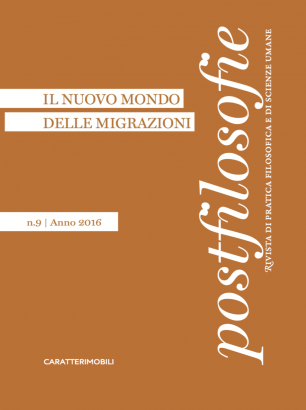Cosa signica ospitare? Forme di ospitalità mediterranea
DOI:
https://doi.org/10.15162/1827-5133/994Keywords:
dono, ospitalità, Mediterraneo, migrazioni / gift, hospitality, Mediterranean, migrationsAbstract
La dimensione simbolica dell'ospitalità si basa sul concetto di "dono". Partendo da questa tesi, l'articolo analizza come diverse culture mediterranee abbiano sviluppato la loro concezione dell'ospitalità riferendosi a una particolare categoria di soggetti: i viaggiatori. Più specificamente, questo studio si concentra sulla concezione islamica dell'ospitalità. Secondo l'Islam, l'ospitalità si fonda su uno scambio di doni bilaterale: tra Dio e gli esseri umani (scambio di doni verticale) e tra gli esseri umani stessi (scambio di doni orizzontale). Alla luce di questi presupposti, è possibile sottolineare che Islam, Ebraismo e Cristianesimo condividono un'idea comune di ospitalità; questo comune ethos dell’ospitalità può costituire una nuova prospettiva per le politiche di immigrazione e un nuovo percorso assiologico per una pacifica convivenza culturale.
The symbolic dimension of hospitality is based on the concept of “gift”. Starting from this thesis, the paper analyses how different Mediterranean cultures developed their conception of hospitality referring to a particular category of subjects: the travellers. More specifically, this study focusses on the Islamic conception of hospitality. According to Islam, hospitality is grounded in a bilateral gift exchange: between God and mankind (vertical gift exchange) and among human beings (horizontal gift exchange). In the light of these assumptions, it is possible to underline that Islam, Judaism and Christianism share a common idea of hospitality; this common ethos of hospitality can constitute a new perspective for the immigration policies and a new axiological path for a pacific cultural cohabitation.
References
ARKOUN V. M. E BORRMANS M., L’Islam, religion et société, Ed. du Cerf, Paris 1982.
BENTHALL J., Organized Charity in the Arabic-Islamic World A view from the NGOs, H. Donan (a cura di), Interpreting Islam, Sage, London 2001.
BENTHALL J. E BELLION-JOURDAN J., The Charitable Crescent Politics of Aid in the Muslim World, I. B. Tauris, London 2009.
BONNER M., Poverty and charity in the Rise of Islam, M. Bonner, M. Ener e A. Singer (a cura di), Poverty and Charity in Middle Eastern Contexts, State University of New York Press, Albany 2003, pp. 16-20.
BROWN P., Povertà e leadership nel tardo impero romano, trad. it. Laterza, Roma-Bari 2003.
DASSETTO F., L’incontro complesso. Mondi occidentali e mondi islamici, trad. it. Città Aperta, Troina 2004.
GODBOUT J. T., Recevoir c’est donner, in «Communications», n. 65/1997, pp. 35-47.
HERZFELD M., “As in Your Own House” Hospitality, Ethnography, and the Stereotype of Mediterranean Society, D. D. GILMORE (a cura di), Honor and Shame and the Unity of the Mediterranean, American Anthropological Association, Special Publication, n. 22/1987.
FALCIONI D., Conceptions et pratiques du don en Islam, in «Revue du MAUSS», nr. 39 / 2012.
GODBOUT J. T., Recevoir c’est donner, in «Communications», n. 65/1997, pp. 35-47.
KHALDUN I., Discours sur l’histoire universelle. Al-Muqaddima, Sindbad, Paris 2007.
PIZZI G., Ibn Haldun e la Muqaddima: una filosofia della storia, All’insegna del pesce d’oro, Milano 1985.
ROSENTHAL F., Hiba, Encyclopaedia of Islam, CD-ROM Edition v. 1.0, vol. iii.
ROUSSEAU J. J., Les Rêveries du promeneur solitaire, Gallimard, Paris 1964.
SINGER A., Charity in Islamic Societies, Cambridge University Press, Cambridge 2008.
Downloads
Published
Issue
Section
License
“Post-Filosofie” utilizza Open Journal Systems 2.4.8.5, che è un software open source per la gestione e la pubblicazione di riviste sviluppato, supportato e distribuito gratuitamente dal Public Knowledge Project sotto la GNU General Public License.
Gli autori che pubblicano su questa rivista accettano le seguenti condizioni:
- Gli autori mantengono i diritti sulla loro opera e cedono alla rivista il diritto di prima pubblicazione dell'opera, contemporaneamente licenziata sotto una Licenza Creative Commons - Attribuzione che permette ad altri di condividere l'opera indicando la paternità intellettuale e la prima pubblicazione su questa rivista.
- Gli autori possono aderire ad altri accordi di licenza non esclusiva per la distribuzione della versione dell'opera pubblicata (es. depositarla in un archivio istituzionale o pubblicarla in una monografia), a patto di indicare che la prima pubblicazione è avvenuta su questa rivista.
- Gli autori possono diffondere la loro opera online (es. in repository istituzionali o nel loro sito web) prima e durante il processo di submission, poichè può portare a scambi produttivi e aumentare le citazioni dell'opera pubblicata (Vedi The Effect of Open Access).
"Post-Filosofie" uses Open Journal Systems 2.4.8.5, which is an open source journal management and publication software developed, supported and distributed free of charge by the Public Knowledge Project under the GNU General Public License.
Authors publishing in this journal accept the following conditions:
- Authors retain the rights to their work and assign to the journal the right of first publication of the work, simultaneously licensed under a Creative Commons Licence - Attribution that allows others to share the work indicating intellectual authorship and first publication in this journal.
- Authors may enter into other non-exclusive licensing agreements to distribute the published version of the work (e.g., deposit it in an institutional repository or publish it in a monograph), as long as they indicate that the first publication was in this journal.
- Authors may disseminate their work online (e.g. in institutional repositories or on their website) before and during the submission process, as it may lead to productive exchanges and increase citations of the published work (See The Effect of Open Access).







